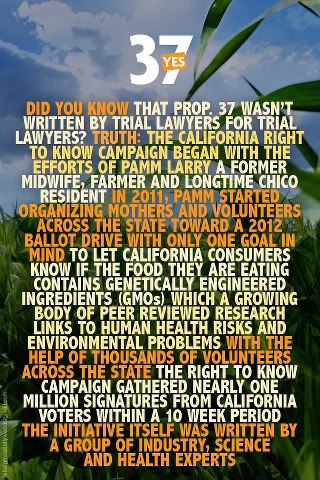Leifer
Senior Member.
I do support labeling anything harmful, that is sold to the average consumer. Unfortunately the AMA, (American Medical Association), the WHO (World Health Organization), the FDA (Food and Drug Administration)....all do not support California's proposition 37's claims.
Are the AMA, WHO, and the FDA's pockets being lined ? Is that a suspicion, an assumption, or a truth ? Is there proof of that ? Just because they are large organizations, is no proof of lined pockets. Are any of those entities profit making enterprises ? If this is an assumption, then why are there many regulations that benefit you and others, that they enforce and support to make your life better? Are you picking-and-choosing which areas and policies based on emotional appeal ?
Do you think that there is some conspiracy engaged upon, that those entities are part of ? Is there some cover-up by the thousands of employees and scientists working for these agencies ? And has the rest of the independent scientists also been rallied into telling lies, to make for a better Monsanto ? Sure there are "a few" studies that claim that GM plants are harmful. But the vast majority of studies say that there is no harm found.
Prop 37 is an emotional appeal and not based on science...in fact, it is an anti-science suggestion, suggesting that "there may be" some harm. If that were the case, many other issues can be seen as "there may be some harm"....so let's regulate those to, while we are at it. The problem I have with prop 37, is that it claims to be the "right to know" initiative....but strangely, it does not "know" itself what is regulating against. It has no compelling evidence....not in the broad understanding of GMO's. It suggests that the people will have the ability to "know" what is in their food....but ask any able-bodied voter why and how GMO's are hurting them....they will end up with a question mark above their heads.
There is a falsehood that prop 37 is about "the right to know". It is not about that. It's an attempt to "hurt" GM suppliers and growers, in an attempt to stop them. This is what genuinely disturbs me about this proposition....it's a fake cover. It would not disturb me so much if it were to really state it's intended purpose.....to halt GM plantings until further investigation. Instead, it is rallying the average person to believe that GMO's are already harmful, and that labeling them will enable in an informed choice. I am an organic produce and product supporter. I support organic farming, in fact I practice it. I cannot support a proposition that lies to achieve an alternate end, while it tries to convince the public of sketchy science....it's so disingenuous, at it's core.
AMA, WHO, FDA...are their pockets perhaps lined with Monsanto's $$$? do they hold all the answers? the facts? FDA fast tracking GMO's? for Monsanto, this comes down to money, to the organic farmers...it is so much more than that...if the (independent) organic farmers were in it for the money, there wouldn't be any...they are thinking of healthy ecosystems, that benefit many, not just share holders. i don't give a rat's ass what the AMA, WHO ans FDA say!
Are the AMA, WHO, and the FDA's pockets being lined ? Is that a suspicion, an assumption, or a truth ? Is there proof of that ? Just because they are large organizations, is no proof of lined pockets. Are any of those entities profit making enterprises ? If this is an assumption, then why are there many regulations that benefit you and others, that they enforce and support to make your life better? Are you picking-and-choosing which areas and policies based on emotional appeal ?
Do you think that there is some conspiracy engaged upon, that those entities are part of ? Is there some cover-up by the thousands of employees and scientists working for these agencies ? And has the rest of the independent scientists also been rallied into telling lies, to make for a better Monsanto ? Sure there are "a few" studies that claim that GM plants are harmful. But the vast majority of studies say that there is no harm found.
Prop 37 is an emotional appeal and not based on science...in fact, it is an anti-science suggestion, suggesting that "there may be" some harm. If that were the case, many other issues can be seen as "there may be some harm"....so let's regulate those to, while we are at it. The problem I have with prop 37, is that it claims to be the "right to know" initiative....but strangely, it does not "know" itself what is regulating against. It has no compelling evidence....not in the broad understanding of GMO's. It suggests that the people will have the ability to "know" what is in their food....but ask any able-bodied voter why and how GMO's are hurting them....they will end up with a question mark above their heads.
There is a falsehood that prop 37 is about "the right to know". It is not about that. It's an attempt to "hurt" GM suppliers and growers, in an attempt to stop them. This is what genuinely disturbs me about this proposition....it's a fake cover. It would not disturb me so much if it were to really state it's intended purpose.....to halt GM plantings until further investigation. Instead, it is rallying the average person to believe that GMO's are already harmful, and that labeling them will enable in an informed choice. I am an organic produce and product supporter. I support organic farming, in fact I practice it. I cannot support a proposition that lies to achieve an alternate end, while it tries to convince the public of sketchy science....it's so disingenuous, at it's core.


